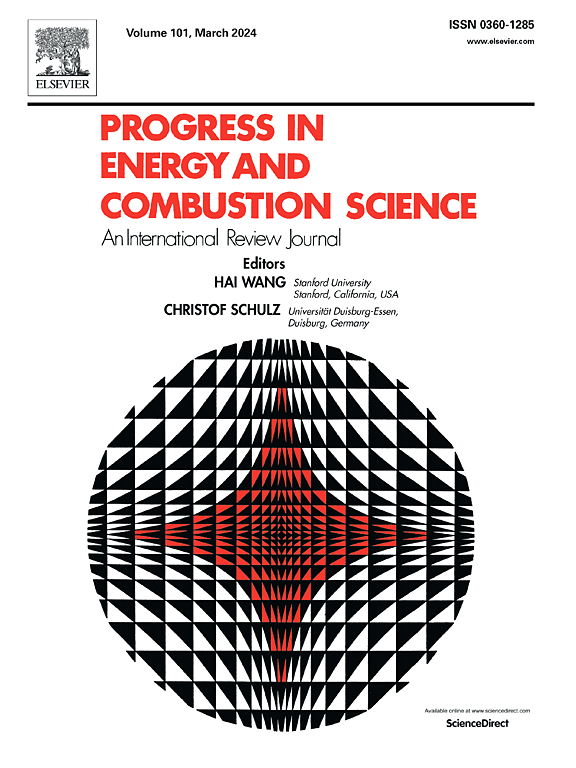Review of electrofuel feasibility—prospects for road, ocean, and air transport
IF 32
1区 工程技术
Q1 ENERGY & FUELS
引用次数: 22
Abstract
To meet climate targets the emissions of greenhouse gases from transport need to be reduced considerably. Electrofuels (e-fuels) produced from low-CO2 electricity, water, and carbon (or nitrogen) are potential low-climate-impact transportation fuels. The purpose of this review is to provide a technoeconomic assessment of the feasibility and potential of e-fuels for road, ocean, and air transport. The assessment is based on a review of publications discussing e-fuels for one or more transport modes. For each transport mode, (a) e-fuel options are mapped, (b) cost per transport unit (e.g. vehicle km) and carbon abatement costs are estimated and compared to conventional options, (c) prospects and challenges are highlighted, and (d) policy context is described. Carbon abatement costs for e-fuels (considering vehicle cost, fuel production and distribution cost) are estimated to be in the range 110–1250 € tonne−1 CO2 with e-gasoline and e-diesel at the high end of the range. The investigated combined biofuel and e-fuels production pathways (based on forest residues and waste) are more cost-competitive than the stand-alone e-fuel production pathways, but the global availability of sustainable biomass is limited making these pathways more constrained. While the potential for e-fuels to decarbonize the transport sector has been discussed extensively in the literature, many uncertainties in terms of production costs, vehicle costs and environmental performance remain. It is too early to rule out or strongly promote particular e-fuels for different transport modes. For e-fuels to play a significant role in transportation, their attractiveness relative to other transport options needs to be improved. Incentives will be needed for e-fuels to be cost-effective and increased clarity on how e-fuels are linked to existing policies is needed.电燃料可行性综述——公路、海洋和航空运输的前景
为了实现气候目标,交通运输的温室气体排放需要大幅减少。由低二氧化碳含量的电力、水和碳(或氮)生产的电燃料(e-fuels)是潜在的低气候影响运输燃料。本综述的目的是对电动燃料用于公路、海洋和航空运输的可行性和潜力进行技术经济评估。该评估是基于对讨论一种或多种运输方式的电子燃料的出版物的审查。对于每种运输模式,(a)绘制了电子燃料选项图,(b)估算了每个运输单位(例如车辆公里)的成本和碳减排成本,并与传统选项进行了比较,(c)强调了前景和挑战,(d)描述了政策背景。电动燃料的碳减排成本(考虑车辆成本、燃料生产和分销成本)估计在110-1250欧元/吨- 1二氧化碳的范围内,其中电动汽油和电动柴油在范围的高端。所研究的生物燃料和电子燃料联合生产途径(基于森林残留物和废物)比单独的电子燃料生产途径更具成本竞争力,但全球可持续生物质的可用性有限,使这些途径受到更多限制。虽然电子燃料在运输部门脱碳方面的潜力已经在文献中得到了广泛的讨论,但在生产成本、车辆成本和环境绩效方面仍然存在许多不确定性。现在就排除或大力推广针对不同运输方式的特定电子燃料还为时过早。为了使电子燃料在交通运输中发挥重要作用,需要提高其相对于其他交通选择的吸引力。需要采取激励措施,使电子燃料具有成本效益,并需要进一步明确电子燃料如何与现有政策相关联。
本文章由计算机程序翻译,如有差异,请以英文原文为准。
求助全文
约1分钟内获得全文
求助全文
来源期刊

Progress in Energy and Combustion Science
工程技术-工程:化工
CiteScore
59.30
自引率
0.70%
发文量
44
审稿时长
3 months
期刊介绍:
Progress in Energy and Combustion Science (PECS) publishes review articles covering all aspects of energy and combustion science. These articles offer a comprehensive, in-depth overview, evaluation, and discussion of specific topics. Given the importance of climate change and energy conservation, efficient combustion of fossil fuels and the development of sustainable energy systems are emphasized. Environmental protection requires limiting pollutants, including greenhouse gases, emitted from combustion and other energy-intensive systems. Additionally, combustion plays a vital role in process technology and materials science.
PECS features articles authored by internationally recognized experts in combustion, flames, fuel science and technology, and sustainable energy solutions. Each volume includes specially commissioned review articles providing orderly and concise surveys and scientific discussions on various aspects of combustion and energy. While not overly lengthy, these articles allow authors to thoroughly and comprehensively explore their subjects. They serve as valuable resources for researchers seeking knowledge beyond their own fields and for students and engineers in government and industrial research seeking comprehensive reviews and practical solutions.
 求助内容:
求助内容: 应助结果提醒方式:
应助结果提醒方式:


